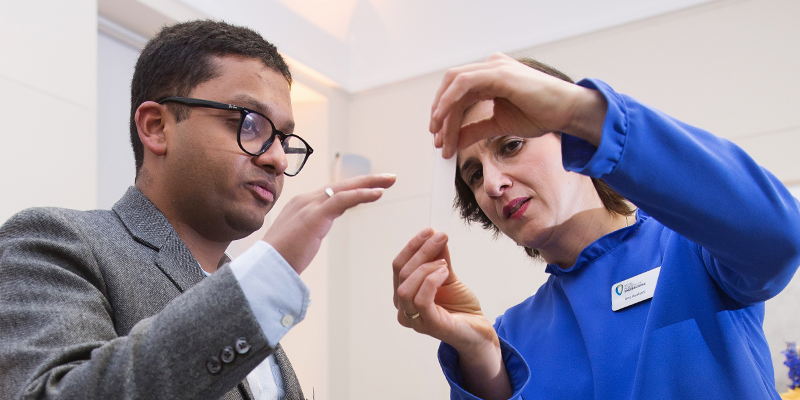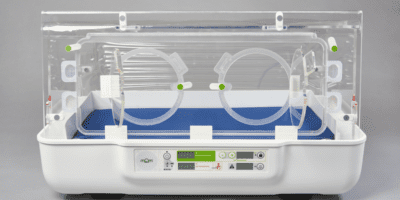Ana Avaliani is the director of enterprise and sustainable development at the Royal Academy of Engineering, working with businesses to commercialise their innovations, and to deliver social and commercial impact. Ana started her career in telecommunications but soon became fascinated by policy and has worked in a number of organisations including the University of Greenwich, the London Development Agency and PA Consulting Group before moving to her current role. One part of her portfolio is leading the Academy’s Enterprise Hub, which is a go-to place for engineering and tech entrepreneurs looking to start up and grow their businesses.
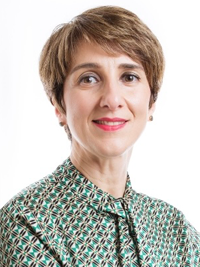
“Our goal is to encourage creativity and innovation in engineering for the benefit of all. By fostering lasting, exceptional connections between talent and expertise, we aim to create a virtuous cycle of innovation that can deliver on this ambition.”
The common thread running through my career: Innovation
To the great disappointment of my grandparents, I didn’t pursue medicine despite studying maths, physics, chemistry, and biology at A-level. Instead, my first degree is in journalism, and I have a master’s degree in technology policy.
My career path spans private, public and charity sectors with one common thread – innovation. I started my career in a telecommunications start-up in Tbilisi, Republic of Georgia, where I was the eighth employee and the only woman.
As is the case with start-ups, in the early days, I fulfilled multiple job functions at once, from setting up first roaming contracts for our clients to managing the office, organising shareholder meetings and, occasionally, translating equipment manuals. I had a brilliant opportunity to work across a number of functions before settling on innovation and technology scouting.
By the time I left, the company had grown to over 700 employees, achieved country-wide network coverage and established itself as a disruptor and innovator leading the way with new services for its multimillion customer base.
My interest in innovation and technology led me to a degree course at the University of Cambridge in technology policy, swiftly followed by a job at a former polytechnic, leading on knowledge transfer activities for multiple schools including the school of health and social care, helping to bring medical devices to market.
Fascinated by policy, I joined the London Development Agency to lead on the innovation programme for London Thames Gateway, one of the major regeneration areas in the country.
I spent six years overseeing some of the organisation’s flagship programmes, which led to a stint at a technology and innovation consultancy, PA Consulting Group, working with a diverse range of clients in the UK and abroad. One of my last projects at PA was in Beirut, Lebanon, setting up a technology hub to support the local engineering and technology entrepreneurs.
Working with some of the brightest engineering and technology minds from across the world
I joined the Royal Academy of Engineering at the end of 2015 to lead its Enterprise Hub, which had been set up a few years before my arrival. I was tasked with establishing the Enterprise Hub as a go-to place for engineering and tech entrepreneurs looking to start up and grow their businesses. In 2022, Sifted named the Enterprise Hub as one of the top 10 accelerators in the UK.
In my current role, I am responsible for the Academy’s entrepreneurship programmes in the UK and overseas, including our flagship Africa Prize for Engineering Innovation and Leaders in Innovation Fellowship (LIF) programmes, as well as capacity building programmes in lower and middle-income countries.
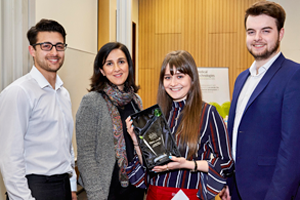
With my brilliant team, we are making the most of the Academy’s convening power to speed up the translation of world-class research and creative problem solving into cutting edge innovations with significant social and commercial impact.
Turning inventions into real-world impact
The Royal Academy of Engineering Enterprise Hub supports the UK’s brightest technology and engineering entrepreneurs to realise their potential.
We run programmes for entrepreneurial engineers at different career stages. Each one offers equity-free funding, an extended programme of mentorship and coaching, and a lifetime of support through connection to an exceptional community of engineers and innovators.
The Enterprise Hub focuses on supporting individuals and fostering their potential in the long term, taking nothing in return — this sets us apart from the usual ‘accelerator’ model. The Enterprise Hub’s programmes last between six and 12 months, and all programmes give entrepreneurs lifelong access to an unrivalled community of mentors and alumni.
Our goal is to encourage creativity and innovation in engineering for the benefit of all. By fostering lasting, exceptional connections between talent and expertise, we aim to create a virtuous cycle of innovation that can deliver on this ambition.
The Enterprise Hub was formally launched in April 2013. Since then, we have supported over 300 researchers, recent graduates, and small business leaders to start and scale up businesses that turn their inventions into real-world impact. Our Hub members have gone on to raise over £800 million in additional funding and have created more than 5,000 high skilled jobs.
Responding to the pandemic
We were very lucky to be in a line of business that could move online without major impact on the quality of service provided to our community. The Academy’s investment in digital technology and the agility of its delivery model has enabled us to mobilise and switch to an online mode of working swiftly and smoothly during COVID-19.
We were also able to rapidly set up a major pandemic response programme, bringing together the global engineering community to provide technical expertise and support to the government, support our entrepreneurs in sub-Saharan Africa via Project CARE and share best practice from around the globe.
Engineers, of course, have a critical role to play in responding to and preparing for pandemics, from designing and manufacturing ventilators, Personal Protective Equipment (PPE), and testing kits, to building field hospitals in record time, advising on appropriate ventilation of buildings, and keeping us connected through digital infrastructure.
Championing inclusion
Diversity and inclusion are a critical thread that runs through the academy’s strategy. It is one of our core values that we are living through our own operation, and we play an active role in improving diversity and inclusion in engineering, which we continue to push throughout the pandemic and beyond.
Some of the initiatives led by the Academy to support people from underrepresented groups in the engineering community include:
- The Amazon Future Engineer bursary, aimed at supporting female A-level and BTEC/OCR (or Scottish equivalent) students from low-income households who wish to study computer science or related engineering courses at UK universities;
- The Diversity Impact Programme, to inspire change in university engineering departments so that all students succeed and the unique perspectives and experiences of engineers from diverse backgrounds continue to enhance the profession;
- Access Mentoring, to provide additional pre-submission support to those from underrepresented groups within UK engineering applying for Academy funding opportunities;
- The Graduate Engineering Engagement Programme (GEEP), which aims to increase the transition of engineering graduates from diverse backgrounds into engineering employment;
- Our Fit for the Future initiative, which aims to increase the diversity of our Fellowship by setting an aspiration that at least half of all candidates elected each year will be from groups currently underrepresented in our Fellowship. This includes female, Black, Asian and minority ethnic, LGBT+ and disabled engineers, and those who have come into engineering via vocational and non-traditional routes.
As an employer, it is also really important to us that we apply best practice in diversity and inclusion to our own people strategy, and that we benchmark our progress. The Academy signed the BITC Race at Work Charter to amplify our commitment to improving equality of opportunity and outcomes of minority ethnic colleagues in the workplace.
We are also a Disability Confident Committed employer and in 2021 we took part in Progression Framework 2.0 benchmarking exercise for UK professional engineering institutions (PEIs) and scientific bodies to help track and plan progress on diversity and inclusion across ten areas of professional body activity.
Prompted by the pandemic, the Academy has also launched a flexible working policy centred on Your Day, Your Say guiding principles, which enables colleagues to tailor their working patterns to their own needs.
Reflecting diversity in society and striving for inclusive outcomes
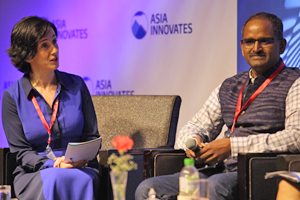
Engineers are drivers of real progress, creative problem-solvers who are tackling global challenges, and therefore need to be at the forefront of inclusive approaches and diverse thinking if they are to succeed in their endeavours. If engineering is really going to serve all of society it needs to reflect that society’s diversity, and to strive for inclusive outcomes. Dr Youmna Mouhamad’s hair comb is one such example.
🇬🇧 Often detanglers are not designed for textured hair, or #4c hair. We made a deliberate choice to work with women with tight curls when developing the Deluxe Detangler.
🇨🇵 Nous avons délibérément choisi de développer le Deluxe Detangler pour les cheveux 4c hair. #innovation pic.twitter.com/yHeJOvVUOb— Nyfasi (@Nyfasi_UK) June 6, 2022
Sadly, there are still too many examples of lack of diversity of thought resulting in products and systems that don’t reflect the needs of a broad base of customers and the society we live in today. The Academy is leading the profession in the drive to diversify engineering, embed inclusive cultures, and drive real progress.
Shining a spotlight on women in engineering
First and foremost, International Women in Engineering Day is a brilliant celebration of the work and achievements of women engineers from around the world. It is also a great opportunity to shine the spotlight on the exciting career opportunities engineering affords as it shapes the world around us, and helps make our planet a better, cleaner, safer, and more exciting place to be.
Women in senior leadership positions have a huge responsibility to use their talent and their position to stand up for what they believe in and use their success to further others.
Coming up next
Over the last year, we have celebrated some great successes at the Academy, from our first female winner of the Africa Prize for Engineering Innovation to opening our first regional Enterprise Hub, in Belfast, Northern Ireland, and launching the Regional Talent Engines programme to create equal opportunities for entrepreneurs across multiple regions in the UK.
We have huge ambitions, working towards delivering against our strategic goal to harness the power of engineering to build a sustainable society and an inclusive economy that works for everyone.
There is much to look forward to, but I am particularly excited about continuing to build the network of regional Enterprise Hubs across the UK and the launch of our Diversity and Inclusion toolkit later this summer to support leadership teams of early-stage technology and engineering companies to create inclusive and diverse organisations from inception.

